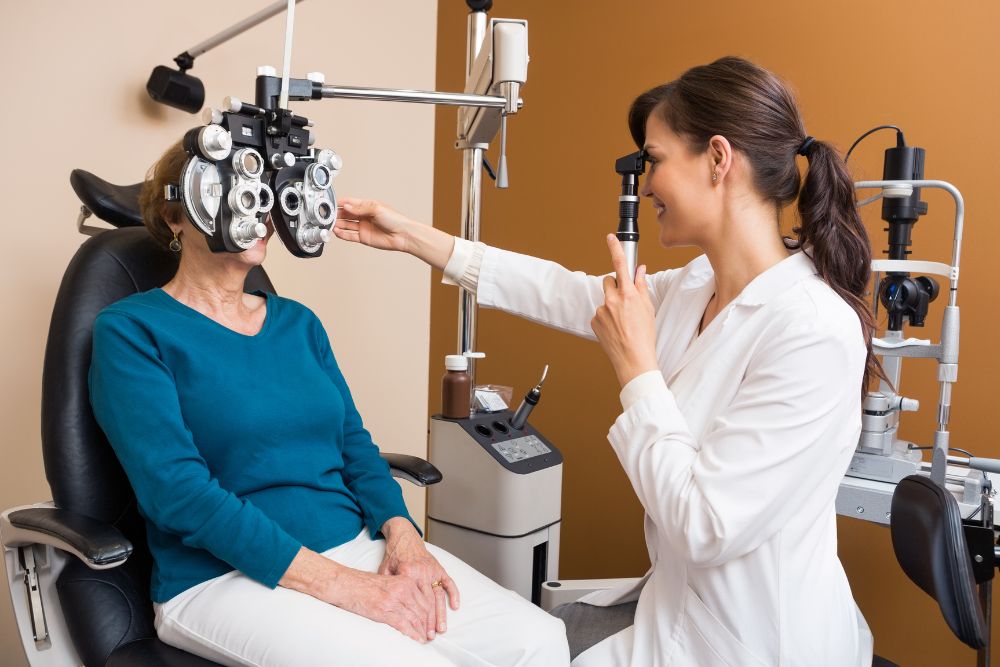Reasons You May be Referred to a Retina Specialist

Should your ophthalmologist need outside assistance, you may be referred to a retina specialist. These specially trained eye doctors specialize in treating specific disorders of the retina, macula, and vitreous (the gel-like substance that fills the eye). Retina specialists work closely with your ophthalmologist to keep them updated on your condition.
Retina Specialist vs. Ophthalmologist
An ophthalmologist is an eye doctor with advanced surgical and medical training to manage all aspects of eye care, including diagnosing and treating eye diseases, performing surgery, and prescribing/fitting eyeglasses and contact lenses. Retinal specialists provide more specific care, for conditions such as age-related macular degeneration (AMD), diabetic retinopathy, and other vitreoretinal issues.
Conditions That Require a Retina Specialist
Diabetic Eye Conditions
Research shows that people with diabetes have a higher risk of vision complications. The CDC estimates that 8.6% of Americans with diabetes have a retinal disorder called diabetic retinopathy. Half of those diagnosed with diabetic retinopathy experience vision loss as a result of the disorder.
The longer diabetic retinopathy goes unaddressed, the more likely it is to progress into its final and most severe form, proliferative diabetic retinopathy (PDR). PDR causes the eye to develop abnormal, fragile blood vessels that bleed into the vitreous cavity, leading to severe vision loss. A retina specialist can evaluate and perform surgery to shrink or remove these abnormal vessels before further damage occurs.
Retinal Tear or Detachment
If you develop a tear in your retina, seeing a retina specialist for care is absolutely crucial. Left untreated, retinal tears can lead to a full retinal detachment, a medical emergency in which the retina is moved completely out of its proper position against the back wall of the eye. Retina specialists can identify small retinal tears before they become problematic, and quickly perform a surgery that seals the hole and/or stabilizes the retina.
Age-Related Macular Degeneration (AMD)
If you have dry AMD, you may be referred to a retina specialist, particularly if you are at risk of developing geographic atrophy (GA) or wet AMD. These symptoms include:
- Metamorphopsia (the shape of objects appears distorted)
- Scotomas (blind spots)
- Symptoms of retinal fluid leakage (floaters, seeing streaks or lines, hazy vision, red-tinted vision, or visual problems that worsen in the morning)
A retina specialist can provide a prompt, accurate diagnosis, and, if necessary, start you on intravitreal injections of anti-vascular endothelial growth factor (anti-VEGF) medications to inhibit abnormal blood vessel growth.
Retinal Artery & Vein Occlusions
Retina specialists are commonly referred to treat blockages (occlusions) in the retinal arteries, veins, and their respective branches, particularly when macular edema or ischemia (i.e. lack of proper blood flow and oxygenation) is present. A retina specialist will assess and determine the appropriate care and treatment, including laser therapies or injected medications.
Schedule an Exam with a Retina Specialist
While your ophthalmologist can handle most vision needs, you may be referred to a retina specialist for vitreoretinal conditions requiring specialized care. If you’d like to schedule a retinal eye exam or ask questions, contact Retina Group of Florida.

